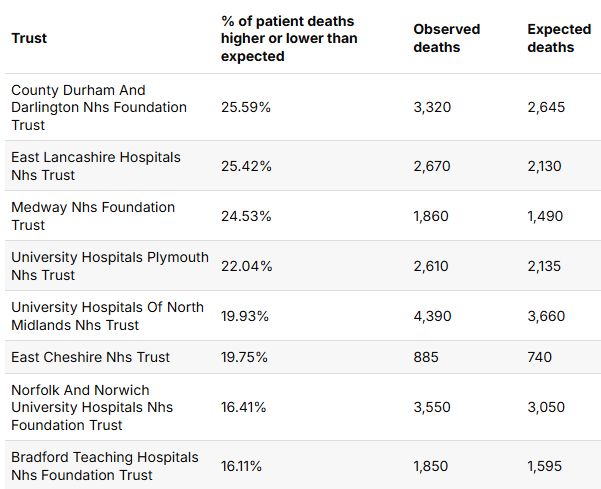Posted: 11/08/2025
Higher patient deaths in the NHS
Reading Time: 2 minutes
Official reports show more patients are dying within the NHS than should be. Data from NHS England shows various NHS Trusts in England have had higher than expected fatalities between March 2024 – February 2025. It includes deaths both in the hospital and within 30 days of being discharged from the hospital and the statistics shockingly show deaths up to 25% higher than expected in certain NHS Trusts.
The 8 NHS Trusts with higher than expected rates of deaths are set out below:

Out of the 8 Trusts which show higher deaths than expected, 6 were repeated from data from the previous year, including Medway NHS FT, East Lancashire Hospitals NHS Trust, Norfolk and Norwich University Hospitals NHS FT and Bradford Teaching Hospitals NHS FT.
The system for recording levels of patient deaths at hospital trusts is called the summary hospital-level mortality indicator (SHMI). It was brought into action following a public inquiry into the Mid Staffordshire NHS Foundation Trust, with the aim of early identification of any potentially worrying trends in deaths, so that swift action can be taken.
You can find a copy of the summary of higher deaths at: SHMI – Deaths associated with hospitalisation, England, March 2024 – February 2025: One Page Summary. This also shows a number of hospitals which have had less deaths than expected, including the Chelsea and Westminster Hospital NHS FT, Imperial College Healthcare NHS Trust and St George’s University Hospital NHS FT.
A higher rate of deaths at any one Trust does not necessarily show that there has been negligent care, with NHS England commenting that some deaths are sadly avoidable but it does raise questions as to why the rates are higher than anticipated and whether at least some of the deaths are avoidable, particularly given the widely reported issues with the NHS over recent years, such as in respect of waiting times.
If a loved one has died in hospital or shortly after being discharged from hospital, our experienced clinical negligence team may be able to assist with investigating the circumstances of this and exploring whether the death could have been avoided. Whilst we appreciate that such investigations cannot bring a loved one back, we recognise the value in obtaining answers and justice for those who have been lost and we are here to support you every step of the way.
FRIENDLY, EFFICIENT LEGAL ADVICE
We’re ready to chat when you are
Drop us an email or give us a call for a no obligation chat to see if we can help.